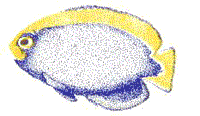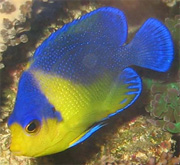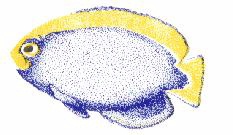|
Breeding Pygmy Angels
By Jim McCubbins, LMAS
Summer of 1988, I had barely gotten my feet wet in the
world of a marine hobbyist. My fisrt marine tank was a 20 gal, extra high.
As a rookie I made all the classic mistakes. One thing I did do right was
to use 3 Black Mollies to cycle the tank.
After 30 days the Pet Shops were eager to sell me any
kind of fish and as many fish as my budget could handle. Fortunetly in
those first few months the waste of marinelife was sparse. It happened
that a curtain pet shop was getting out of the marine fish fare in lieu
of selling African Ciclids. I was in the shop and the owner offered to
give me two little purple and yellowed face fish and a baby snowflake eel.
Needless to say my 20 gal. tank had some new members.
As time went on I discovered that the two little fish
were Pygmy Angelfish (Centropyge argi). Approx. 6 months after the pygmys
were in the tank, I noticed something strange going on after the lights
on the tank went out at around 9:00 PM. During the six months one of the
pygmys had grown considerably bigger than the other. The larger of the
pygmys began to race around the 20 gal. tank and fade in color. Well I
paniced, turned the lights back on and tried to determine what was wrong
with the fish. For the next couple of weeks it was constant trips to the
pet shops, water testing. None of the pet shops knew what was wrong with
the fish and I finally bought a copy of Beginer to Breeder by Martin Moe.
After reading the book, a couple of times, I guessed that the pygmys were
in courtship when all the racing around the tank occured.
Back to the Black Mollies. The only experience I had up
to this point in time was a pair of black mollies I kept after cycling
the 20 gal. tank. I kept them in a 5 gal container which was saltwater
and they started having babies and I assure you Black Mollies have a lot
of fully developed babies at birth.
After a couple of weeks of watching the pygmys go through
their breeding cycle. I first started to search the tank for hours for
any signs of little baby fish. I read Mr. Moe's book, again, in the section
on breeding, there was a picture of some Royal Gamma eggs attacked to some
algae. He also mentioned that most marine fish on the reef were palegic
breeders, which basically means that they release their eggs out into the
oceans and they float to the surface.
Possibly 2months after I realized the pygmy's were breeding
I purchased a 3" hand held magnifing glass. It's hard to put into words
the excitement I felt the first time I peered over top of the 20 gal. tank
appoximately a half hour after all breeding activity had stopped. I had
turned the lights back on, held the magnifing glass to focus at the surface
of the water and there were hundreds of tiny round circles, eggs !
The next several months were spent in finding out the
best way to collect and hatch out the eggs. It took me appoximately six
months to develope a system for collection and hatching the little pygmy's
eggs. The Pygmy Angelfish is a very hardy species, this fact I know very
well. As I was just barely what many hobbyist would cassify a beginer when
this breeding thing was taking place. I made many many mistakes, but somehow
the Pygmy's survived all my mistakes.
After I was able to transfer the hatched eggs to two gals.
tanks , it took me six months to figure out how to get the fry to live
for more than a couple of days. From this point I spent a little over 3
years trying to rear the pygmy fry past metamorphysis. I never did succeed
but I don't think anyone else has had success with rearing this particular
species to adult fish.
I agreed to write this for Jim with the hopes it will
create more interest in attempting to try your luck at rearing some of
the animals we all so dearly cherish. A world of information is pretty
easy to obtain on rearing many different species of the common species
we keep in our tanks. A lot of information has been obtained since 1988.
If anyone has need to learn more on the subject of breeding and rearing,
feel free to contact.
Happy Marine'n
Jim McCubbins lives in Louisville KY, he was instrumental
in organizing MACNA 7, and is one of the few to reach the seven day barrier
with raising Pygmy Angel fry, which appears to be a food size issue.
|











